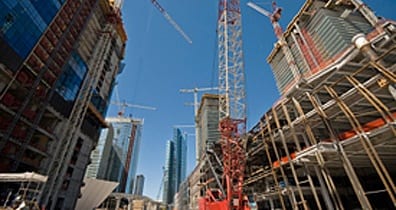After a dynamic year for hotel occupancy in 2015, demand spurred a rise in planned hotel construction in most major markets. 4,721 hotel projects were under contract in the US as of March 2017 — a 14.4% increase over last year. 1,449 of those are in development, which is a 24.4% increase over 2016.
All this new inventory is being planned and built during a wave of confidence as occupancy continues to grow to all-time highs. ADR is also growing at close to 3% and the new supply is not predicted to impede continued RevPAR growth. While this is great news for hotels across the US, when does the addition of more than 500,000 rooms become a concern instead of a sign of prosperity?

Factors such as stable airfare and low gas prices may continue to help spur transient and leisure travel to fill additional new rooms, but what will happen to hotel’s group business? As local competition increases, group sales teams may not be able to rely on traditional business and will have to find new opportunities that align with their revenue goals.
“We’re feeling the new inventory. They’re going after our meetings business aggressively,” says Kerry Kuhl, National Sales Manager for The Kahala Hotel & Resort on Oahu. And though the Hawaiian Islands are seeing a significant number of new properties, other markets are scheduled to experience even more impactful growth: New York has the greatest number of additional rooms planned, while markets like Nashville and Seattle will see the most exponential growth.
Many hotels are still riding the high of record occupancy levels, but as construction continues to boom, hotels will have to get strategic about group business. The never-ending flood of third-party RFPs will keep coming in, but if hotels start to lose group business to new competitor properties, they’ll need efficient ways to make sure they’re finding quality leads that actually convert. This means hotel sales teams will need to take a more proactive approach to group selling to open doors and build relationships with groups and planners whose meetings align with their property-specific parameters (week days, revenue, meeting room size, etc.).
The good news is that new inventory is not predicted to affect positive RevPAR growth; but hoteliers need to start thinking ahead and planning for growing pains. It’s never too early to start actively prospecting for new group opportunities and filling pipelines with new potential business.
About Knowland
Knowland provides group data and innovative technology to help hotels, CVBs, and other venues drive revenue with meetings market intelligence. Knowland offers extensive insight into market analytics, industry trends, and powerful benchmarking for booking better-qualified group business. Acting on behalf of the hospitality industry as a whole as well as its customers, Knowland continually strives to increase transparency of the group market and deliver best-in-class meetings and events sales solutions.
![]()
